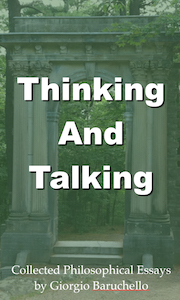
|
Thinking And Talking
Paperback, $29.95 USD. Purchase from
Amazon.
“Perhaps, one day we will learn to evaluate the success of an economic system by the actual
wellbeing that it creates across peoples and generations, securing means of life and opportunities
to lead a meaningful existence, rather than by the volume of lifeless sums of money stated by the balance sheet.”
Baruchello’s fifth collection of essays brings his diverse philosophical interests—Gadamer,
Socrates, Gestalt psychology, Catholic ethics, Icelandic public policy, to name only a few examples—into
a unified exploration of the interpersonal dimension of human reason. His writerly voice is similarly
diverse: there’s straight-up academic prose, and Heideggerian aphorisms, a gentle sense of humour, and
an intimate account of how he explains philosophy to his children. Thinking And Talking is a book for
those who still believe that philosophy is about love, not only the love of wisdom, but also the love of humanity.
Contents
PART I – Talking Knowledge
Chapter 1: The Disappearance of Buttons: A Philosopher’s Look at Ergonomics
Chapter 2: The Socratic Method
Chapter 3: Reflections on Sergi Avaliani’s Philosophical Investigations
Chapter 4: Reflections on Ian Hacking and the Science Wars
Chapter 5: Reflections on David Lewis’ Australian Materialism
Chapter 6: A Phenomenological Reading of Donald Davidson’s Philosophy
PART II – Thinking Rhetoric
Chapter 7: Reflections on Deleuze’s Humour
Chapter 8: Reflections on Gadamer’s Hermeneutics and Vico’s Thought
Chapter 9: Reflections on Pareto’s Rhetoric
Chapter 10: Reflections on Moral Philosophy in Pascal’s Thoughts
Chapter 11: Reflections on Richard Rorty’s Hortative “We”
Chapter 12: Gestalt Psychology and the Tropes of Rhetoric
PART III – Talking Rhetoric
Chapter 13: Heideggerian Aphorisms
Chapter 14: What Is Value? A Meditation on Inflation and the Meaning of Life
Chapter 15: A Letter from Iceland
Chapter 16: Explaining Life-value Onto-axiology to a Child
Chapter 17: On Modernism
Chapter 18: On Catholicism, Abortion, and Social Democracy: Lessons from Iceland
Chapter 19: The Inequality of Political Correctness
|
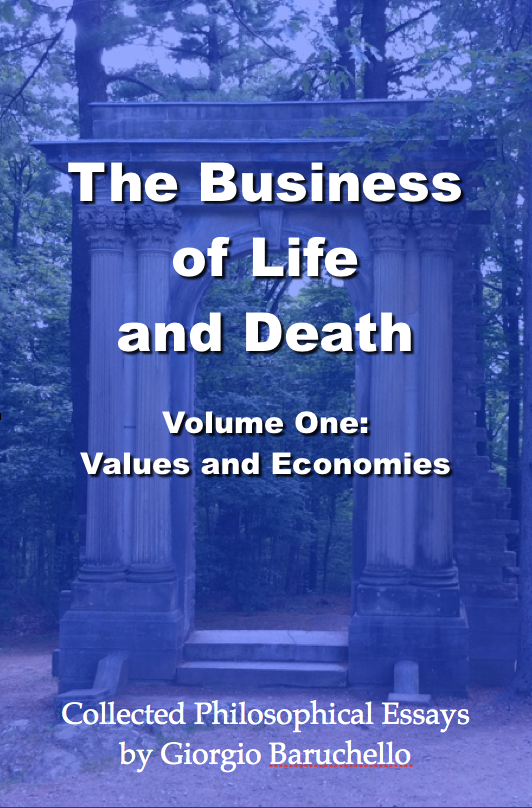
|
The Business of Life and Death, Volume One:
Values and Economies
Paperback, $29.95 USD. Purchase from
Amazon.
As Descartes did for epistemology and Lévinas did for ethics, Baruchello places social and
political philosophy as the new ‘first philosophy’. His research in the intersecting fields
of economics, power politics, knowledge, and reality, presented here and in The Business of
Life and Death Volume 2: Politics, Law, and Society, continues the work of John McMurtry,
and fills in the unacknowledged missing pieces in the work of Paul Krugman, Naomi Klein,
and Noam Chomsky, among others. He lays bare the frightening reality of how capital has
controlled our understanding of knowledge, ethics, and meaning, to the detriment of the
life-flourishing of peoples and environments. Yet his argument remains optimistic: he
shows how the power of capital can be escaped, and how the life-ground of human goodness
can replace it.
Contents
Part I - Introductions
The Cancer Stage of Capitalism
Value Wars
From Crisis to Cure
Part II - Applications
What Is to Be Conserved? An Appraisal of Political Conservatism
Good and Bad Tourism
Paul Krugman’s Banking Metastases
Social Philosophy and Oncology
On the Mission of Public Universities
Part III - Implications
Adam Smith, Historical and Rhetorical
Cornelius Castoriadis and the Crux of Adam Smith’s Liberty
The Price of Tranquility: Cruelty and Death in Adam Smith’s Liberalism
Adam Smith Can Never Be Wrong
Five Books of Economic History
A History of Economics
Epilogue: Good and Bad Capitalism
Read the introduction, and the chapter "What is to be conserved?", in PDF.
Purchase from Amazon.
|
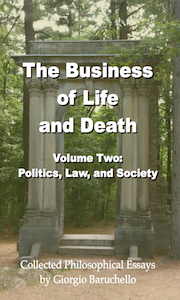
|
The Business of Life and Death, Volume Two:
Politics, Law, and Society
by Giorgio Baruchello
Paperback, $29.95 USD. Purchase from Amazon
With patient logic, comprehensive research, a courageous sense of purpose, and indeed a gentle sense of humour, this volume of Baruchello’s essays continues the work of John McMurtry, and fills in the unacknowledged missing pieces in the work of Martha Nussbaum, Hans Jonas, and Arthur Fridolin Utz, among others.
Baruchello lays bare the frightening reality of how capital has controlled our understanding of knowledge, ethics, and meaning, to the detriment of the life-flourishing of peoples and environments. Yet his argument remains optimistic: he shows how the power of capital can be escaped, and how the life-ground of human goodness can replace it.
Contents
Part I - Socialist and Conservative Perspectives
Einstein’s Socialism
Cornelius Castoriadis and “The Crisis of Modern Society”
Martha Nussbaum and John McMurtry
Giulio Tremonti’s Exit Strategy: Ending the Tyranny of Finance
Arthur Fridolin Utz’s Economic Ethics
Hans Jonas qua Political Thinker
Part II - Contemporary Legal and Social Issues
The ICESCR qua Civil Commons
Europe’s Constitutions qua Civil Commons
Iceland and the Crises
Eight Noble Opinions and the Economic Crisis: Four Literary-philosophical sketches à la Eduardo Galeano
Read the introduction, and the chapter "Einstein's Socialism", in PDF.
Purchase from Amazon
|
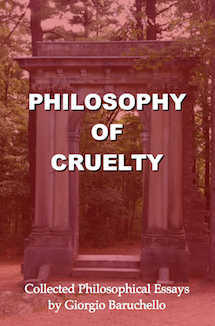
|
Philosophy of Cruelty
by Giorgio Baruchello
Paperback, $19.95 USD. Purchase from Amazon
Baruchello’s Philosophy of Cruelty, the second collection of his essays,
turns a difficult and emotionally charged topic into a surprisingly informative and
enlightening read. Covering the history of Western philosophy’s treatment of cruelty
as a topic, yet relating every point to present-day occasions of violence and
injustice, this book is a touchstone for any discussion of cruelty as a philosophical
theme. It pulls no punches, yet it leaves you standing taller.
Contents
Part I - Debating Cruelty
Two Questions about Cruelty
Three Perspectives On Cruelty
Two Questions about Liberalism of Fear
Part II - Cruelty in the History of Thought
No Pain, No Gain: The Understanding of Cruelty in Western Philosophy
The Politics of Cruelty: On Sade and Nietzsche
Ordinary Hell: Reflections on Penal Justice between Dante and Nils Christie
Part III - Libera Nos A Crudelitate
Disciplinary Divisions and Petty Academics: In Memory of Richard Rorty
The Ironic and Painful Cornering of Liberalism of Fear
Enemies of Interculturalism. The Economic Crisis in light of Xenophobia, Liberal Cruelties and Human Rights
Read the Introduction, and the chapter "Two Questions About Cruelty", in PDF.
Purchase from Amazon
|
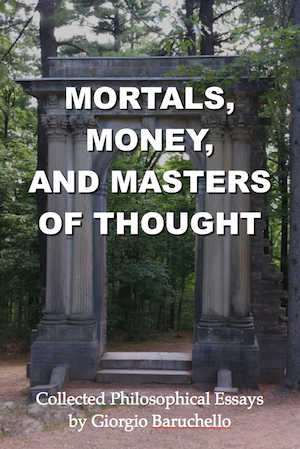
|
Mortals, Money, and Masters of Thought
Paperback, $19.95 USD. Purchase from Amazon
Mortals, Money, and Masters of Thought is a thoroughly enjoyable medley of philosophical
meditations. Covering a very wide variety of topics, from metaphysical matters like the
nature of history and art, to practical and ethically serious matters like global
economic injustice, this collection nevertheless offers a remarkably coherent reading
experience, where all topics are joined together by the common theme of death.
This is the work of an enquiring mind, investigating the most serious matters with
logical clarity and also with imaginative playfulness.
Contents
Part I - Mortals
Death and Anti-Anti-Death. A Cultural Exploration
Death and Life Support Systems
Mechanism, Galileo’s Animale and Heidegger’s Gestell: Reflections on the Lifelessness of Modern Science
Part II - Money
Deadly Economics: Reflections on the Neoclassical Paradigm
Life and Death Economics: A Dialogue
Life and Death Economics Revisited: One Year On
Cruelty and Austerity: Philip Hallie’s Categories of Ethical Thought and Today’s Greek Tragedy
Part III - Masters of Thought
Montaigne and Nietzsche: Ancient and Future Wisdom
Homer, Heroes and Humanity: Vico’s New Science on Death and Mortality
Contingency, Autonomy and Inanity: Cornelius Castoriadis on Human Mortality
Religion’s Gestalt. Reflections on Michael Polanyi, Tacit Knowing and Mortality
Read the Introduction, and the chapter "Death and Anti-Anti-Death", in PDF.
Purchase from Amazon
|







